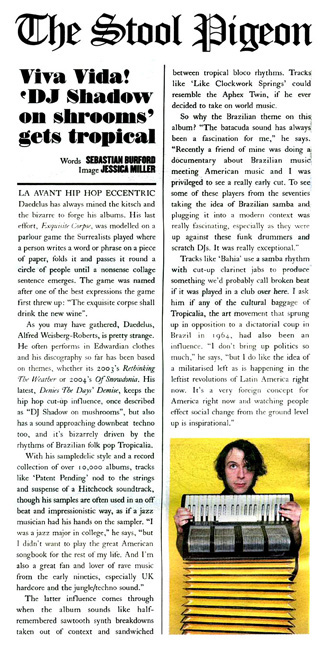
VIVA VIDA!
"DJ Shadow on shrooms" gets tropical
LA avant hip-hop eccentric Daedelus has always mined the kitsch and the bizarre to forge his albums. His last effort, Exquisite Corpse, was modeled on a parlour game the Surrealists played where a person writes a word or phrase on a piece of paper, folds it and passes it round a circle of people until a nonsense collage sentence emerges. The game was named after one of the best expressions the first game threw up: "The exquisite corpse shall drink the new wine."
As you may have gathered, Daedelus, Alfred Weisberg-Roberts, is pretty strange. He often performs in Edwardian clothes and his discography so far has been based on themes, whether it's 2003's Rethinking the Weather or 2004's Of Snowdonia. His latest, Denies the Day's Demise, keeps the hip-hop cut-up influence, once describes as "DJ Shadow on mushrooms," but also has a sound approaching downbeat techno too, and it's bizarrely driven by the rhythms of Brazilian folk pop Tropicalia.
With his sampledelic style and a record collection of over 10,000 albums, tracks like 'Patent Pending' nod to the strings and suspense of a Hitchcock soundtrack, though his samples are often used in an offbeat and impressionistic way, as if a jazz musician had his hands on a sampler. "I was a jazz major in college," he says, "but I didn't want to play the great American songbook for the rest of my life. And I'm also a great fan and lover of rave music from the early nineties, especially UK hardcore and the jungle/techno sound."
The latter influence comes through when the album sounds like half-remembered sawtooth synth breakdowns taken out of context and sandwiched between tropical bloco rhythms. Tracks like 'Like Clockwork Springs' could resemble the Aphex Twin, if he ever decided to take on world music.
So why the Brazilian theme on this album? "The batacuda sound has always been a fascination for me," he says. "Recently a friend of mine was doing a documentary about Brazilian music meeting American music and I was privileged to see a really early cut. To see some of these players from the seventies taking the idea of Brazilian samba and plugging it into a modern context was really fascinating, especially as they were up against these funk drummers and scratch DJs. It was really exceptional."
Tracks like "Bahia" use a samba rhythm with cut-up clarinet jabs to produce something we'd probably call broken beat if it was played in a club over here. I ask him if any of the cultural baggage of Tropicalia, the art movement that sprung up in opposition to a dictatorial coup in Brazil in 1964, had also been an influence. "I don't bring up politics so much," he says, "but I do like the idea of a militarized left as is happening in the leftist revolutions of Latin America right now. It's a very foreign concept for America right now and watching people effect social change from the ground level up is inspirational."
SEBASTIAN BURFORD